Unit 4 I used to be afraid of the dark. Section A(3a-3c)课件 (共23张PPT)
文档属性
| 名称 | Unit 4 I used to be afraid of the dark. Section A(3a-3c)课件 (共23张PPT) | 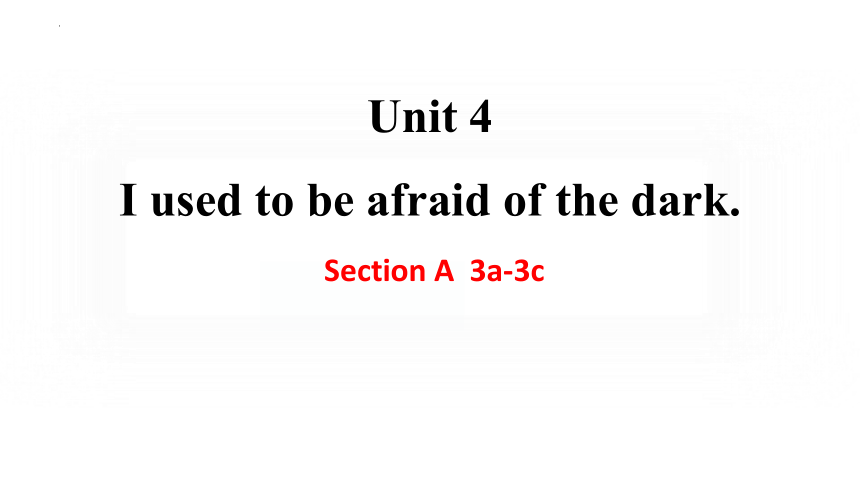 | |
| 格式 | pptx | ||
| 文件大小 | 850.5KB | ||
| 资源类型 | 教案 | ||
| 版本资源 | 人教新目标(Go for it)版 | ||
| 科目 | 英语 | ||
| 更新时间 | 2023-10-06 08:44:03 | ||
图片预览

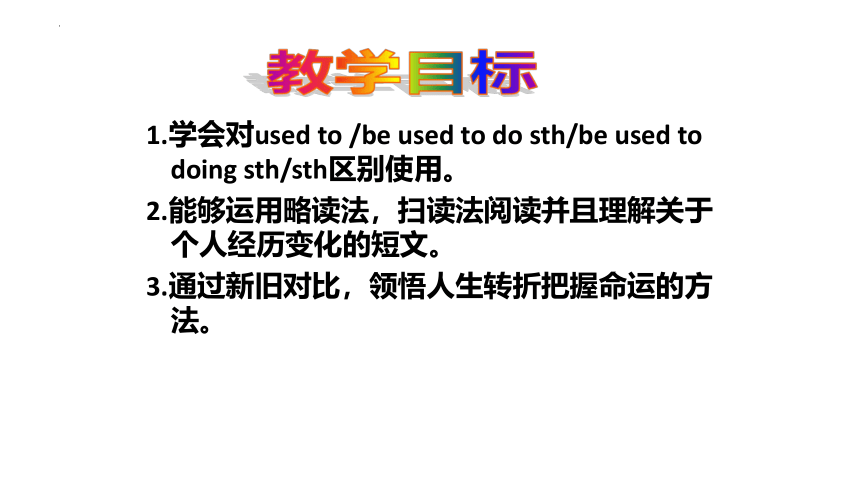
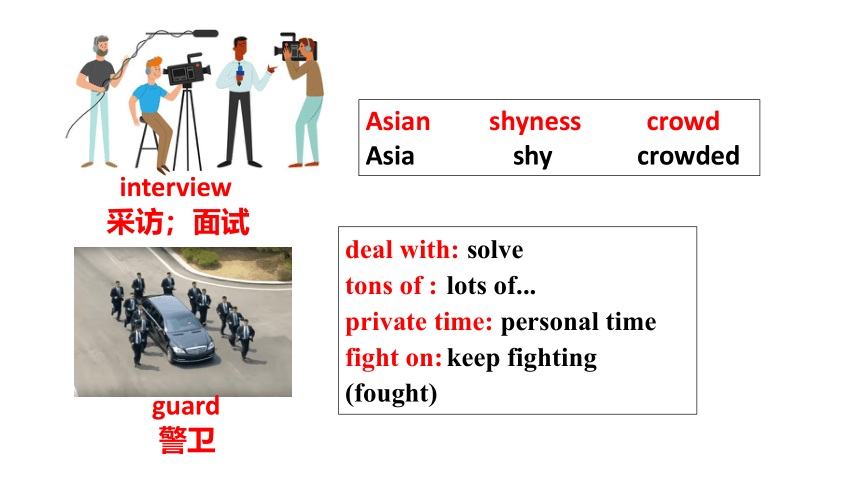
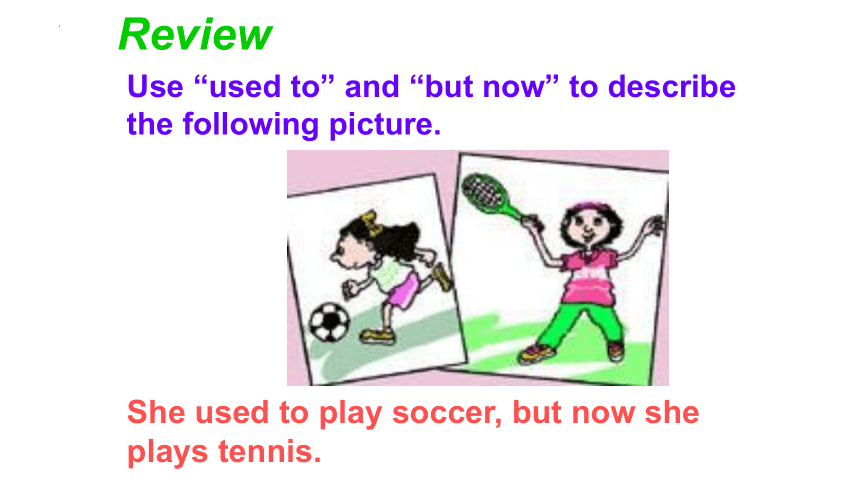
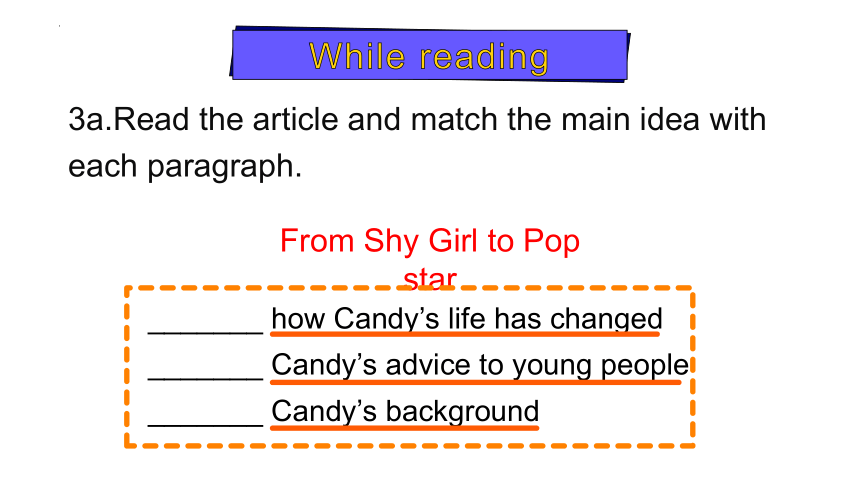
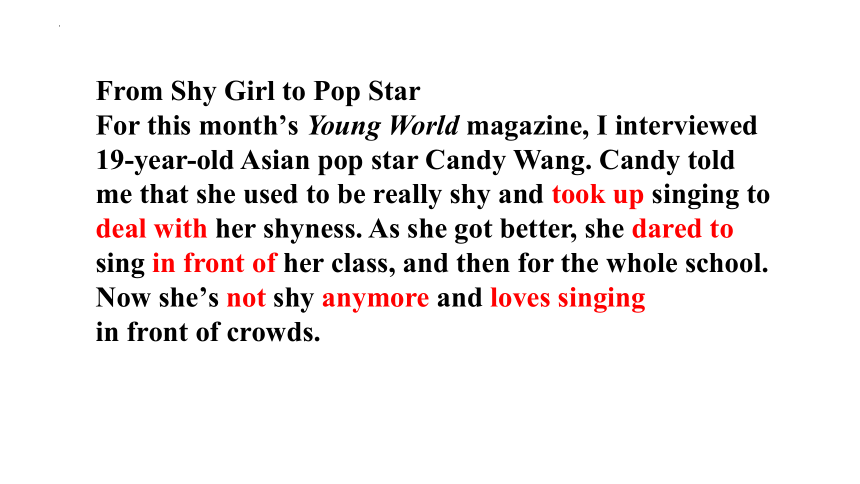
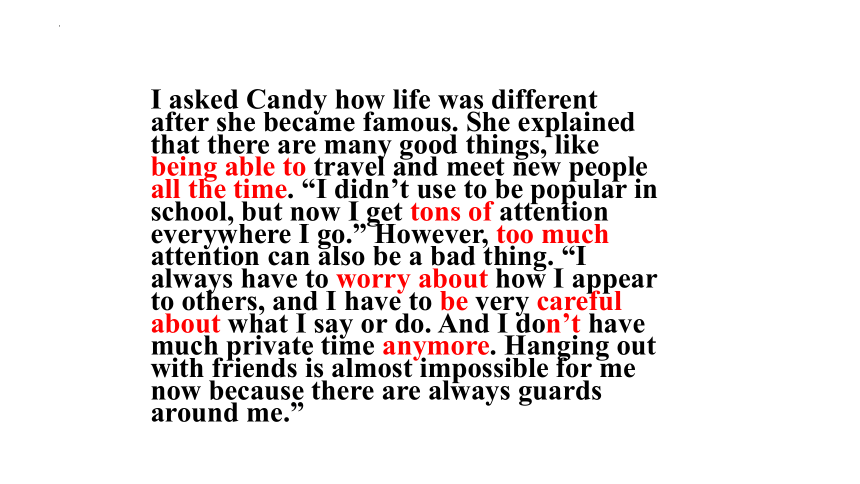
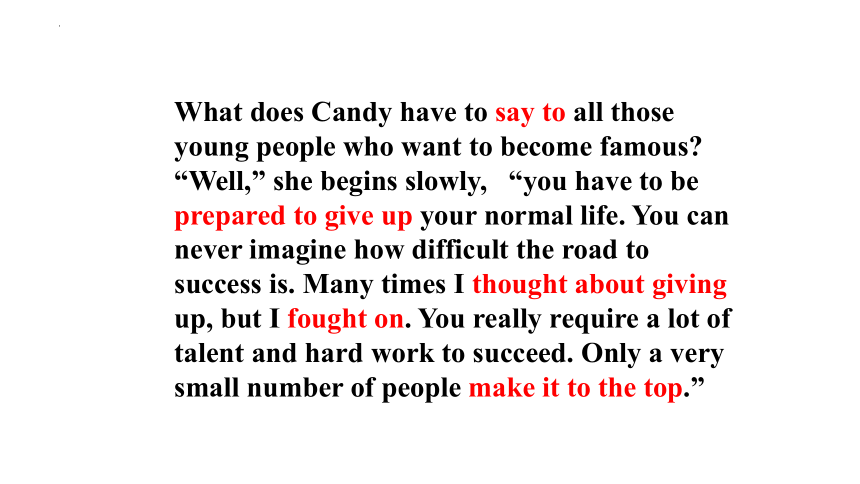
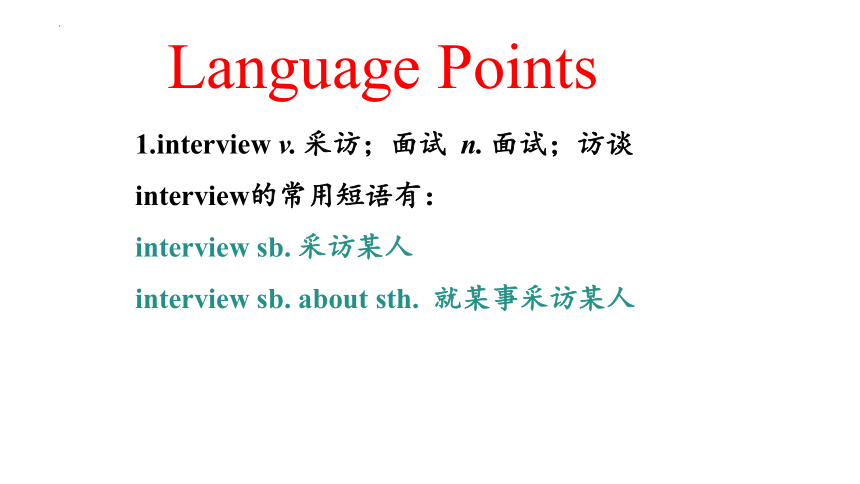
文档简介
(共23张PPT)
Unit 4
I used to be afraid of the dark.
Section A 3a-3c
1.学会对used to /be used to do sth/be used to doing sth/sth区别使用。
2.能够运用略读法,扫读法阅读并且理解关于个人经历变化的短文。
3.通过新旧对比,领悟人生转折把握命运的方法。
教学目标
interview
采访;面试
guard
警卫
Asian shyness crowd
Asia shy crowded
deal with:
tons of :
private time:
fight on:
(fought)
solve
lots of...
personal time
keep fighting
Use “used to” and “but now” to describe the following picture.
Review
She used to play soccer, but now she plays tennis.
From Shy Girl to Pop star
_______ how Candy’s life has changed
_______ Candy’s advice to young people
_______ Candy’s background
While reading
3a.Read the article and match the main idea with each paragraph.
From Shy Girl to Pop Star
For this month’s Young World magazine, I interviewed 19-year-old Asian pop star Candy Wang. Candy told me that she used to be really shy and took up singing to deal with her shyness. As she got better, she dared to sing in front of her class, and then for the whole school. Now she’s not shy anymore and loves singing
in front of crowds.
I asked Candy how life was different after she became famous. She explained that there are many good things, like being able to travel and meet new people all the time. “I didn’t use to be popular in school, but now I get tons of attention everywhere I go.” However, too much attention can also be a bad thing. “I always have to worry about how I appear to others, and I have to be very careful about what I say or do. And I don’t have much private time anymore. Hanging out with friends is almost impossible for me now because there are always guards around me.”
What does Candy have to say to all those young people who want to become famous “Well,” she begins slowly, “you have to be prepared to give up your normal life. You can never imagine how difficult the road to success is. Many times I thought about giving up, but I fought on. You really require a lot of talent and hard work to succeed. Only a very small number of people make it to the top.”
1.interview v. 采访;面试 n. 面试;访谈
interview的常用短语有:
interview sb. 采访某人
interview sb. about sth. 就某事采访某人
Language Points
开始从事某事
2.take up 以某事作为消遣或爱好;
占据(某空间或时间)”等。
Many retired people take up gardening as a hobby.
The old books take up too much room of my office.
3.dare v. 敢于;胆敢
dare to do sth. 敢于做某事
e.g. He doesn’t dare to jump from the top of the wall.
他不敢从墙上跳下来。
4.do with 与deal with 两者都可以用来表示“处理”
do 侧重于对象,deal 侧重于方式方法。在特殊问句中,do with 与what 连用,deal with 则与How 连用。
I don’t know how they deal with the problem.
= I don’t know what they do with the problem.
5. Now she’s not shy anymore and loves singing in front of crowds.
现在她再也不羞涩了,并且喜欢当众唱歌。
(1) not ... anymore = no more,意为“不再”。
He doesn’t come late anymore.
= He no more comes late. 他不再迟到了。
(2) crowd此处用作名词,意为“人群;观众;一帮人”。
There were crowds of people at the theater.
剧院里挤满了人。
6.like being able to travel and meet new
people all the time.
…像总是能旅行和结识新朋友。
be able to 与 can 都可以表示 能力,意为
“会;能(够)”。
be able to: 表示经过努力达到目的, 可用于
各种时态
can :表示有能力做某事,仅用于一般现在时和一般过去时
7.tons of 意为“很多的;大量的”,是英语中一种夸张的表达方式。ton的本义为“吨”。
He has been late for school tons of times.
他上学屡次迟到。
8.get…attention 意为“得到/引起......注意”
He tried to get the attention of a passing
policeman.
他试图引起一位路过的警察的注意。
9. prepare 在此处用作及物动词,意为“准备;预备”。
常用搭配:
prepare sth. “准备某物”
prepare sb sth. = prepare sth for sb. 给某人准备某物
prepare to do sth. 表示“准备做某事”
10. require意为“需要”时,
sth. require +V-ing 某物需要被……
require意为“要求”,后面接that从句时,从句中的谓语用“should+动词原形”,should 可以省略。
require sb. to do sth. = require + that从句
要求某人做某事
The chair requires repairing.
The court required him to pay the fine.
(=The court required that he should pay the fine.)
11.fight (fought, fought) 努力去做,尝试
战斗,搏斗;争取
fight on 奋力坚持
e.g. We must fight on until the end of the battle.
我们必须坚持到战斗结束。
12.make it多用于口语,可表示“做成;成功;设法做到;赶上……”等。
— Can we catch the train
— I hope we can make it.
So far, few women have made it to the top in the business world.
1. When I was a child, I used to ______ chocolates.
A. liking B. like C. liked D. likes
2. _____work in Microsoft
A. Did you used to B. Did you use to
C. Do you used to D. Do you use to
3. Where _____ live before you came here
A. did you used to B. did you use to
C. use he to D. he used to
4. No one likes him _______.
A. still B. never C. any more D. too
B
B
B
C
Exercises
5.— Do you like playing computer games — No, but I _____.
A. used to B. didn’t C. do D. don’t
6. — Why don’t you take the bike — It’s expensive. I can’t ____it.
A. sell B. keep C. borrow D. afford
7.— My father has decided to _____smoking.
— That’s good news for us. I hope so.
A. give up B. take out C. give in D. turn off
8. —I don't know how to____the old books.
—Why not give them away to poor children
A. hand out B. give up C. deal with D. take up
9. — She is leaving to take part in the final poem competition.
— I’m proud of her. I wish her a great ________.
A. speed B. method C. pressure D. success
A
D
A
C
D
Homework
1、Try to help parents to do some housework.
2、Read the passage more and learn from Candy.
3、Make some sentences with the phrases in this passage.
4、Preview P28.
THANK YOU
Unit 4
I used to be afraid of the dark.
Section A 3a-3c
1.学会对used to /be used to do sth/be used to doing sth/sth区别使用。
2.能够运用略读法,扫读法阅读并且理解关于个人经历变化的短文。
3.通过新旧对比,领悟人生转折把握命运的方法。
教学目标
interview
采访;面试
guard
警卫
Asian shyness crowd
Asia shy crowded
deal with:
tons of :
private time:
fight on:
(fought)
solve
lots of...
personal time
keep fighting
Use “used to” and “but now” to describe the following picture.
Review
She used to play soccer, but now she plays tennis.
From Shy Girl to Pop star
_______ how Candy’s life has changed
_______ Candy’s advice to young people
_______ Candy’s background
While reading
3a.Read the article and match the main idea with each paragraph.
From Shy Girl to Pop Star
For this month’s Young World magazine, I interviewed 19-year-old Asian pop star Candy Wang. Candy told me that she used to be really shy and took up singing to deal with her shyness. As she got better, she dared to sing in front of her class, and then for the whole school. Now she’s not shy anymore and loves singing
in front of crowds.
I asked Candy how life was different after she became famous. She explained that there are many good things, like being able to travel and meet new people all the time. “I didn’t use to be popular in school, but now I get tons of attention everywhere I go.” However, too much attention can also be a bad thing. “I always have to worry about how I appear to others, and I have to be very careful about what I say or do. And I don’t have much private time anymore. Hanging out with friends is almost impossible for me now because there are always guards around me.”
What does Candy have to say to all those young people who want to become famous “Well,” she begins slowly, “you have to be prepared to give up your normal life. You can never imagine how difficult the road to success is. Many times I thought about giving up, but I fought on. You really require a lot of talent and hard work to succeed. Only a very small number of people make it to the top.”
1.interview v. 采访;面试 n. 面试;访谈
interview的常用短语有:
interview sb. 采访某人
interview sb. about sth. 就某事采访某人
Language Points
开始从事某事
2.take up 以某事作为消遣或爱好;
占据(某空间或时间)”等。
Many retired people take up gardening as a hobby.
The old books take up too much room of my office.
3.dare v. 敢于;胆敢
dare to do sth. 敢于做某事
e.g. He doesn’t dare to jump from the top of the wall.
他不敢从墙上跳下来。
4.do with 与deal with 两者都可以用来表示“处理”
do 侧重于对象,deal 侧重于方式方法。在特殊问句中,do with 与what 连用,deal with 则与How 连用。
I don’t know how they deal with the problem.
= I don’t know what they do with the problem.
5. Now she’s not shy anymore and loves singing in front of crowds.
现在她再也不羞涩了,并且喜欢当众唱歌。
(1) not ... anymore = no more,意为“不再”。
He doesn’t come late anymore.
= He no more comes late. 他不再迟到了。
(2) crowd此处用作名词,意为“人群;观众;一帮人”。
There were crowds of people at the theater.
剧院里挤满了人。
6.like being able to travel and meet new
people all the time.
…像总是能旅行和结识新朋友。
be able to 与 can 都可以表示 能力,意为
“会;能(够)”。
be able to: 表示经过努力达到目的, 可用于
各种时态
can :表示有能力做某事,仅用于一般现在时和一般过去时
7.tons of 意为“很多的;大量的”,是英语中一种夸张的表达方式。ton的本义为“吨”。
He has been late for school tons of times.
他上学屡次迟到。
8.get…attention 意为“得到/引起......注意”
He tried to get the attention of a passing
policeman.
他试图引起一位路过的警察的注意。
9. prepare 在此处用作及物动词,意为“准备;预备”。
常用搭配:
prepare sth. “准备某物”
prepare sb sth. = prepare sth for sb. 给某人准备某物
prepare to do sth. 表示“准备做某事”
10. require意为“需要”时,
sth. require +V-ing 某物需要被……
require意为“要求”,后面接that从句时,从句中的谓语用“should+动词原形”,should 可以省略。
require sb. to do sth. = require + that从句
要求某人做某事
The chair requires repairing.
The court required him to pay the fine.
(=The court required that he should pay the fine.)
11.fight (fought, fought) 努力去做,尝试
战斗,搏斗;争取
fight on 奋力坚持
e.g. We must fight on until the end of the battle.
我们必须坚持到战斗结束。
12.make it多用于口语,可表示“做成;成功;设法做到;赶上……”等。
— Can we catch the train
— I hope we can make it.
So far, few women have made it to the top in the business world.
1. When I was a child, I used to ______ chocolates.
A. liking B. like C. liked D. likes
2. _____work in Microsoft
A. Did you used to B. Did you use to
C. Do you used to D. Do you use to
3. Where _____ live before you came here
A. did you used to B. did you use to
C. use he to D. he used to
4. No one likes him _______.
A. still B. never C. any more D. too
B
B
B
C
Exercises
5.— Do you like playing computer games — No, but I _____.
A. used to B. didn’t C. do D. don’t
6. — Why don’t you take the bike — It’s expensive. I can’t ____it.
A. sell B. keep C. borrow D. afford
7.— My father has decided to _____smoking.
— That’s good news for us. I hope so.
A. give up B. take out C. give in D. turn off
8. —I don't know how to____the old books.
—Why not give them away to poor children
A. hand out B. give up C. deal with D. take up
9. — She is leaving to take part in the final poem competition.
— I’m proud of her. I wish her a great ________.
A. speed B. method C. pressure D. success
A
D
A
C
D
Homework
1、Try to help parents to do some housework.
2、Read the passage more and learn from Candy.
3、Make some sentences with the phrases in this passage.
4、Preview P28.
THANK YOU
同课章节目录
- Unit 1 How can we become good learners.
- Section A
- Section B
- Unit 2 I think that mooncakes are delicious!
- Section A
- Section B
- Unit 3 Could you please tell me where the restroom
- Section A
- Section B
- Unit 4 I used to be afraid of the dark.
- Section A
- Section B
- Unit 5 What are the shirts made of?
- Section A
- Section B
- Review of Units 1-5
- Unit 6 When was it invented?
- Section A
- Section B
- Unit 7 Teenagers should be allowed to choose their
- Section A
- Section B
- Unit 8 It must belong to Carla.
- Section A
- Section B
- Unit 9 I like music that I can dance to.
- Section A
- Section B
- Unit 10 You're supposed to shake hands.
- Section A
- Section B
- Review of Units 6-10
- Unit 11 Sad movies make me cry.
- Section A
- Section B
- Unit 12 Life is full of the unexpected
- Section A
- Section B
- Unit 13 We're trying to save the earth!
- Section A
- Section B
- Unit 14 I remember meeting all of you in Grade 7.
- Section A
- Section B
- Review of Units 11-14
